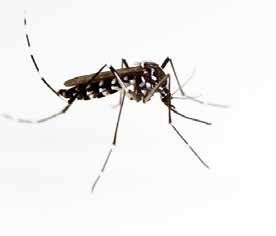Posted: March 2, 2020
Proliferating Pests
The U.S. Department of Agriculture's Animal and Plant Health Inspection Service has spent approximately $640 million to eradicate outbreaks of the Asian longhorned beetle, a wood-boring beetle native to China, in four states.
Now scientists in the college are learning how this insect spreads. Their most recent research has revealed that the larval offspring of these beetles can feed and thrive on tree species whose tissues would sicken their parents, according to Kelli Hoover, professor of entomology. The finding may explain how the beetle expands its range, even when its preferred host trees--maples, elms, and willows--are not nearby.
--Jeff Mulhollem
Mosquito Control
More than half of the people in the world, including those in the United States, live alongside Aedes aegypti, the mosquito that transmits dengue, Zika, and other often deadly viruses. Dengue virus alone infects nearly 400 million people worldwide each year.
To reduce transmission of dengue to humans, scientists have introduced Wolbachia bacteria to A. aegypti mosquitoes. A team of international researchers has found that Wolbachia bacteria's ability to block virus transmission may be maintained by natural selection, alleviating concern that this benefit could diminish over time.
"There has been concern that dengue virus could evolve an ability to sneak past or that the insects themselves could evolve resistance to Wolbachia," said Elizabeth McGraw, professor, Huck Scholar of Entomology, and director of the Center for Infectious Disease Dynamics. "We found that mosquitoes exhibiting better blocking had increased fitness, suggesting the potential for natural selection to maintain blocking."
--Sara LaJeunesse
Leaky Guts
Plants may induce "leaky gut syndrome," or permeability of the gut lining, in insects as part of a multipronged strategy for protecting themselves from being eaten, according to researchers in the college.
"We found that a combination of physical and chemical defenses in corn plants can disrupt the protective gut barriers of fall armyworms, creating opportunities for gut microbes to invade their body cavities," said Charles Mason, postdoctoral scholar in entomology. "This can cause septicemia, which can kill the insect, or simply trigger an immune response, which can weaken the insect. Our results reveal a mechanism by which some plants use insects' gut microbiota against them in collaboration with their own defenses," said Mason.
Gary Felton, professor and head of the Department of Entomology, noted that the results should have broad significance toward understanding the ecological function of plant defenses.
"In the context of our study, disparate plant defenses, such as leaf trichomes and plant enzymes, all require certain gut microbes for their optimal defense against herbivores," he said. "Our results predict that the variation in the effectiveness of plant defenses in nature may be, in significant part, due to the variability observed in the microbial communities of insect guts."
The team said the results could help to inform the development of insect-resistant crops. Mason said, "It may be advantageous to 'stack' plant defenses that target the insect gut in order to create a 'leaky gut' that exposes the insect to microbial assaults on their immune system."
--Sara LaJeunesse
Features
Breaking the Silence on Farm Stress
Farming has always been a demanding profession, but today's farmers face unprecedented pressures that can severely impact their mental health.
Biting Back
Research Targets Vector-Borne Diseases to Save Lives
Leading Forward
Ott brings deep connection to role of dean.



